- Home
- Charles L. Grant
The Grave - An Oxrun Station Novel (Oxrun Station Novels) Page 9
The Grave - An Oxrun Station Novel (Oxrun Station Novels) Read online
Page 9
At the third he had only managed the first three numbers before he lowered his hand slowly. Someone was in the building with him. The receiver slipped from his fingers and cracked against the booth's glass wall. He took a deep breath and slapped open the door.
A shadow beyond the last row of benches, features hidden by the windows' backlighting.
"Hello."
There was no answer.
It was a woman, he thought, her hands clasped primly in front of her. A beret angled toward her right ear. In a suit well-tailored and dark, nearly black.
"Hello?"
He stepped away from the booth, sideswiping his suitcase with one leg. It fell heavily and he reached automatically for it.
"You need help, Josh?"
His eyes closed, opened, and he raised his hands to indicate his helplessness. "I was just trying to call a cab," he said, while Randy Stanworth came out of the shadows. "What are you doing here?"
She shrugged. "I tried to get you earlier today. Your girl told me you were coming back. Thought you could use a lift."
Her pale complexion was made almost translucent by the dark red of her hair, the dark of her eyebrows, the dark of her lips. She had gained weight since he had last seen her some months before, most of it seemingly settling at her hips. She picked up his attaché case before he could object and headed for the exit, her stride short, her back straight. He considered calling her back to demand an explanation, then thought of gift horses and the storm and followed her out to a drop-nosed Jaguar XJ sedan. Once inside, squirming against the cold brown leather, he thanked her for the favor and waited for the lecture.
There was none. She kept her hands firmly on the steering wheel and her gaze straight ahead. The ruffled white blouse beneath her tweedy jacket gave her a figure he knew she didn't have, and gave her a spinsterish cast he knew she didn't feel.
"So. How's Lloyd?"
Her lips were taut, her cheek hollowed. She flexed her fingers and cleared her throat. "He's all right, I guess."
"You guess?" He set himself into the corner and stared at her. Though he could still feel the rolling of the train, smell the damp that clung to his clothes, he ignored it all when he saw the glint of a tear in her too-wide eye. "Randy?"
She sniffed. "Josh, I am so sorry. I simply couldn't wait for you to get home. I had to meet you before you saw anyone else."
He felt a chill, and a dread. "Lloyd. My god, Randy, is—"
"No," she said, though he detected no regret. "No, there hasn't been an accident or a murder, nothing of that sort. I'm just . . . how well do you know Andrea Murdoch?" She glanced at him quickly, looked back at the rain that smashed headlong into the windshield. She was driving slowly; the only thing, he thought, that she ever did with caution.
"Well enough," he said without committing himself.
"You're not having a . . . thing?"
He grinned. "We see each other now and again, if that's what you're asking." Damning himself for knowing exactly the opposite. "Why? Have you met her?"
"No." A cold word. A dead word.
A mile, and they passed the entrance to Hawksted College, began the two-mile stretch to the beginning of the town.
He reached out and touched her arm. She neither flinched nor looked at him. Eyes on the road. Feet placed just so, skirt barely topping the round of her knees. "Randy, are you saying they're having an affair? Lloyd and Andy?" He tried to put as much disbelief into their names as he could, as much for his sake as hers.
"I'm not sure," she said at last. "I wish I knew." Suddenly, she pulled over to the shoulder and turned off the ignition, set the handbrake and covered her face with her hands.
Josh did nothing. Weeping women unnerved him, and his mind was still trying to pull itself away from New York and his work, away from the screams he thought he heard, and back to the Station where an ex-lover was fighting not to believe she'd lost a man. When she fumbled at the clasp of her purse, he took it from her gently and opened it, handed her a tissue, and waited until she had blown her nose, daubed at her eyes. A truck passed, spraying them; it grew darker. He reached to the steering column and turned on the emergency flashers.
"I wish I knew."
"Are . . . I mean—"
"No," she admitted. "I'm not sure at all, to tell you the truth. It's just . . . well, you have to be married, Josh, to know what I mean. The little things that are different, the little things that change when you're not looking."
His voice was toneless: "I'm not married now."
She turned to him and laid a hand on his thigh. "Oh, Josh, I am sorry. I completely forgot, really I did." She braved a smile. "I'm just not thinking straight these days, I guess. It's really got me frantic. I don't know who to turn to."
"How about Lloyd?"
"Oh, he denies it," she said, waving her hand like batting at a fly.
"Well, for crying out loud, Randy, don't you believe him?"
"Of course I do. He knows damned well he can't lie to me. He blushes every time he tries."
He slumped back in his seat, passing a finger over his brow and shaking his head. "Randy, you've confused me. First you ask me if Lloyd and Andy are seeing each other behind your—and my—back. Then you tell me he denies it and you believe him. I don't get it."
A pearl-and-ivory compact was in her hand, a cotton puff repairing the damage done by tears. "You never like to think it's just you, you know. It's always easier when there's someone else to blame. A woman. The proverbial other woman. It's an ego protection, Josh."
"Where is Lloyd now?"
She looked at him, puzzled. "At the hospital, I imagine. He's overseeing the transfer of a patient."
"To West Hartford?"
"Why yes, how did you know?"
"It must be a racket," he said, grinning. "Maybe he knows the guy there—financially, I mean." When he saw the look on her face he held up a quick hand. "Just joking, Randy, don't be so shocked. He did it last month, too. To a friend of a friend. It was just a joke." He took a deep breath. "Look, I haven't eaten all day. Why don't you let me take you to the inn for dinner? I could use the meal, and you could use an ear, I think."
He sighed when he spotted the mother in her take over, however momentarily. She nodded, restarted the car, and pulled back onto Chancellor Avenue without checking the traffic. While she drove, silently, intently, he wondered why she had picked Andrea out of all the women in Oxrun. There were surely others he knew better, saw more frequently; why Andy? Unless all this was merely an excuse to see him alone for a change. He knew he wasn't flattering himself. She still managed to remind him of their time together, one way or another, still made small but unmistakable attempts to see if he were carrying an invisible torch. She had never believed he could be truly happy without her, at the same time not so much a fool as to believe they could have been perfect together. Yet she never begrudged him his liaisons with others.
Not, he thought then, until now, that is.
He laughed shortly, and waved away her questioning glance. Began instead a fervid and somewhat embellished account of his stay in the city, patting the case lovingly as he spoke of the treasures he had hunted down, used every trick he had learned about her to make her laugh with him. When she did he relaxed. And after dinner was over he sent her on her way with a kiss and walked home in the dark. Gallant, he thought as he struggled up the front steps, but incredibly stupid. His arms ached, his back ached, and it wasn't until he was soaking in a hot tub that he realized Andrea's name hadn't come up again.
There was a telephone on a narrow shelf by the tub. He grabbed it, dialed, and listened impatiently to the ringing.
With nothing but a towel wrapped around his waist he stalked through the house. Tried again; no answer.
When he found himself taking frequent peeks through the living room curtains, he knew he was hoping she would drive up unexpectedly, to give him another chance to prove himself with her. The realization disgusted him; that was something an adolescent woul
d do—wishing so hard for his dream that he deluded himself into believing she would happen. After that, when she did not show, there would be a period of mourning, of moping, of pouting.
A third time. It was well past ten and there was no one at the farm.
He sat on the edge of the bed and punched hard at his pillow. He would not give her the satisfaction of calling all night. She knew, she had been told he would get in touch as soon as he returned; if she chose to spend her nights with someone else, that was her problem not his. He had things to do in the morning. There were the manuscripts to send out and be paid for, the sheet music to give to Dale, Mrs. Thames to be coddled by another trip out to the woods . . . the hell with her. And damn Randy Stanworth for making him think this way.
Chapter 11
"Your problem, Joshua," said Melissa Thames, "is simple—you look much too vulnerable. You bring out the A.S.P.C.A. in women."
Even sitting in an enormous Queen Anne wing chair she was tall, her height deliberately cultivated by the wearing of severely tailored suits done in pale greys and pale blues, vertical ruffles on her blouses, thin belts and thinner watchbands, her fog-grey hair cut short as a man's and combed back over her ears without the grace of a curl or a wave. Her face was long, lean, remarkably unlined, dominated above by ghostly blue eyes and below by a large mole at the left corner of her mouth. Handsome, Josh had thought when he had first seen her; she had never been beautiful, but always aristocratically handsome. She had been born into wealth and wore it like one of her favorite cardigans—casually, almost carelessly, but never without an appreciation of its worth.
Her back was straight, her legs crossed at the knee, her hands on the grooved arms as though she were perched on a throne.
"It starts with that smile of yours," she said. "You think it makes you look worldly, cynical, but it doesn't. Only bitter, Joshua, only bitter. Your hair, too. All that gorgeous white on a man your age." She shook her head slowly. "You should dye it. At least darken it. If you ask me—and you didn't, but that isn't going to stop me, you know me better than that—if you ask me, you resemble a man wavering between middle-age and childhood. Like a drenched Irish Wolfhound puppy—so goddamned big and so goddamned young."
He was in a leatherette club chair, a thumb polishing an already bright gold stud on the arm. "What does any of this have to do with your plow?"
Her pencil-line eyebrows rose in regal surprise. "Nothing. Nothing at all. You asked me why you were always in trouble with women. I told you."
"It was a rhetorical question," he said.
She laughed, most of the sound slipping harshly through her nostrils. "You know me better than that," she told him again. "I never accept a rhetorical question."
In his left hand he held a slender glass of cream sherry. He sipped at it, swallowed, stared at the dead maw of a huge fieldstone fireplace. He could walk right in there, he thought, without so much as ducking his head; he could walk right in and immolate himself and no one would be able to tell his ashes from the pine. A hell of a note. A hell of a note. He sighed to himself and sipped the sherry again, knowing he did not have to speak if he didn't want to. Mrs. Thames was patient about things that concerned her deeply, and it hadn't taken him long to understand he was one of them. He did not know why, and he did not mind—outside of his own study, this was the only house in Oxrun where he felt completely comfortable.
And the size of it did not matter.
On the outside, behind the tall stone walls that enclosed the grounds, it seemed like more than a transplanted English Tudor complete with a roof designed to appear thatched. Inside, however, it had been constructed to the owner's scale: large furniture, arched doorways, ceiling-tall windows, long and narrow rooms, all of it to a depth twice as long as the house was wide. Granville Thames had been seven feet tall, and after his death a decade before, his widow had kept everything the same, with one exception: his portrait had been added to hers over the mantelpiece—full-sized and in fox-hunting regalia. And rather than being dizzyingly overwhelming, they were perfect for the room, for the house, for the woman who lived there. It had not taken Josh long to forget they were even there.
"Joshua," she said then, "you have been back from your trip for exactly one week. I thought you would have been out to see me before now."
"I had every intention of doing so," he said. Shrugged. "I didn't get around to it."
"Or not much else, from what I can gather."
He squirmed under her stare, more so because she was right. The day after he'd seen Randy he had slept late. Woke with a headache he was positive would split his skull in half if he should try to move off the pillow. He'd called Felicity and told her he was under the weather. She sympathized, came around before dinner and picked up the manuscripts for shipment to their new owners. He called Andrea; there was no answer. On a whim for which he had no rationalization, he tried to get in touch with Lloyd, and could do nothing more than speak with his answering service.
Andrea was still not home—or answering the telephone—the next morning.
He dressed, then, and drove out to the Murdoch farm. The house was a three-story overlapping clapboard freshly painted white, with a wide, screened-in porch that girdled the building and made it seem shorter than it was. There was no MG in the graveled drive, the curtains and shades drawn. If he hadn't known better, he would have sworn nobody lived there.
After a slow U-turn he parked on the other side of the road and climbed out of the Buick, leaned against the front fender, and lit a cigarette. Smoked for ten minutes. Chain-smoked for half an hour. When he began coughing, he walked into the front yard and circled the house, the two outbuildings behind, passed between two giant maples and into the untilled field beyond. No dogs, no birds, only the hushed chatter of insects. A closer look, and he could not find a newspaper, a bottle of milk, and the garbage cans were empty. The garage was locked, nothing inside.
An hour later he felt the first swirl of guilt and almost ran back to the car. Guilt. Not because he could have been discovered snooping around, but because it had occurred to him that something might have happened to her father in New York, and Andrea had rushed down there to help him. There wouldn't have been time, then, for her to call. Later. When it was all straightened out. Later she would call.
And a week had passed without a word.
"She's a very nice young woman," Mrs. Thames said. "Very bright. Very intelligent."
"Yeah,"
"I suspect, Joshua, you would rather not talk about her."
His smile was automatic, and emotionless.
Mrs. Thames clucked her disappointment. "Not like you," she admonished. "It's not like you at all."
"I'll get over it."
"I know that," she said. "Now all you have to do is believe it yourself."
He grinned, finally laughed, and finished his drink. They spoke for several minutes more—mostly about Agatha West, another one of her ladies' group members who had slipped out of town without leaving a word.
"She's a tramp, of course," she said with a malicious grin. "I don't care how old she is, she's a tramp. She probably took her milkman with her."
This time his laugh was dutiful, nothing more, because he could see at the corners of her eyes a slight tic, a trembling, and an enforced jocularity in her voice that yielded more than it hid.
"She certainly gave herself a hell of a birthday present, I'll say that for the old bat."
He turned away a moment and stared at her portrait.
"You noticed," she said quietly.
"Huh? What?"
"Not the portrait, Joshua, the coincidence."
"Yes," he admitted, memory returning. "Saporral. She walked out on her birthday, too." He managed a weak smile. "Maybe it's in the blood or something. You reach a certain age . . . and you . . ." He faltered at the pain that creased her face beneath the powder. "Melissa," he said, "don't tell me you're afraid."
"You have never used my Christian name before, Joshua."
He waited.
She nodded, finished her sherry, and poured herself another. "I think I am, yes." A hand lifted to keep him silent. "Thelma and Agatha you know about. I don't suppose you know about Esther and Mabel. No. No, you wouldn't. Esther left her house on Devon last November, Mabel her apartment on Steuben just after Christmas. Their . . . birthdays." She stopped, and he said nothing. "It all happened on their birthdays."
He noticed her hand trembling, reached over, and gently took the glass away. "Mrs. Thames—"
"I like Melissa. It's been a long time since a man called me Melissa."
"Melissa."
The smile she gave him was swift, a grimace.
"Melissa, you have to face something, you know. Your age. The ages of your friends. I can't tell you why they left their homes, why they left at all, but maybe I wasn't so far off when I said that thing about reaching a certain age. Maybe they didn't like the fact of facing—"
"Nonsense!" She glared at him in fury, a tantrum so tangible he had to back away. "I don't know who's been feeding you all that nonsense, Joshua, but we've long ago faced what's sweetly called the inevitable. When you reach our time, if you don't you're a fool." A finger, long and ringed with diamonds, touched the depression in her chin. "I read a lot, you know. There's a poem by that man from Baltimore, the one who always writes those silly doggerel things."
"Nash," he said instantly. "Ogden Nash."
"Yes," she said, nodding thoughtfully. "Yes, that's the man. Funny little verses. Granville gave me a collection of his works for our thirtieth anniversary. I still read it, though I don't find them humorous anymore. It's because, Joshua, he wrote a poem about old people in there, one that says that an old man knows when an old man dies."
The room, the house, filled with a silence that lifted the hairs on the back of his neck. Fear; he could feel now the fear she could no longer hide.
"My birthday is next Saturday," she said. "And I'm being watched. I know it."
He started, and she noticed it, snapping his head around to seize his gaze with a frown.

![[Oxrun Station] The Orchard Read online](http://i1.bookreadfree.com/i/03/17/oxrun_station_the_orchard_preview.jpg) [Oxrun Station] The Orchard
[Oxrun Station] The Orchard![Riders in the Sky - [Millennium Quartet 04] Read online](http://i1.bookreadfree.com/i/03/20/riders_in_the_sky_-_millennium_quartet_04_preview.jpg) Riders in the Sky - [Millennium Quartet 04]
Riders in the Sky - [Millennium Quartet 04]![Chariot - [Millennium Quartet 03] Read online](http://i1.bookreadfree.com/i/03/19/chariot_-_millennium_quartet_03_preview.jpg) Chariot - [Millennium Quartet 03]
Chariot - [Millennium Quartet 03]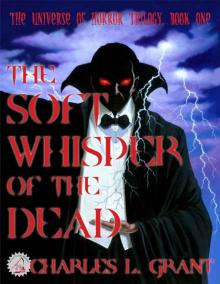 The Universe of Horror Volume 1: The Soft Whisper of the Dead (Neccon Classic Horror)
The Universe of Horror Volume 1: The Soft Whisper of the Dead (Neccon Classic Horror)![[Oxrun Station] Dialing The Wind Read online](http://i1.bookreadfree.com/i/03/19/oxrun_station_dialing_the_wind_preview.jpg) [Oxrun Station] Dialing The Wind
[Oxrun Station] Dialing The Wind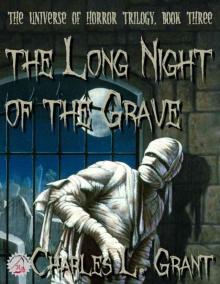 The Universe of Horror Volume 3: The Long Night of the Grave (Neccon Classic Horror)
The Universe of Horror Volume 3: The Long Night of the Grave (Neccon Classic Horror)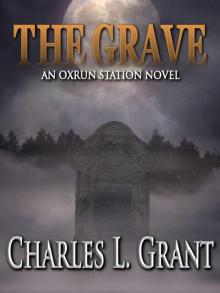 The Grave - An Oxrun Station Novel (Oxrun Station Novels)
The Grave - An Oxrun Station Novel (Oxrun Station Novels)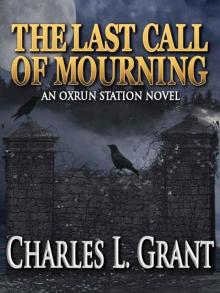 The Last Call of Mourning - An Oxrun Station Novel (Oxrun Station Novels)
The Last Call of Mourning - An Oxrun Station Novel (Oxrun Station Novels)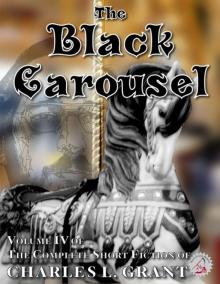 The Complete Short Fiction of Charles L. Grant, Volume IV: The Black Carousel
The Complete Short Fiction of Charles L. Grant, Volume IV: The Black Carousel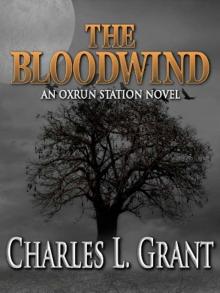 The Bloodwind - An Oxrun Station Novel (Oxrun Station Novels)
The Bloodwind - An Oxrun Station Novel (Oxrun Station Novels)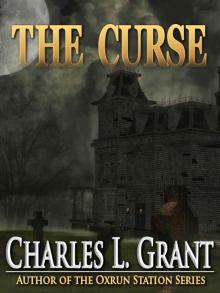 The Curse
The Curse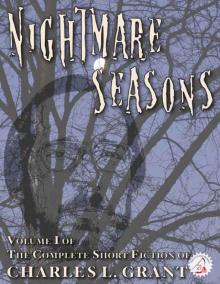 The Complete Short Fiction of Charles L. Grant Volume 1: Nightmare Seasons (Necon Classic Horror)
The Complete Short Fiction of Charles L. Grant Volume 1: Nightmare Seasons (Necon Classic Horror)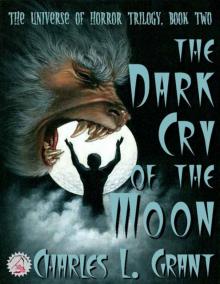 The Universe of Horror Volume 2: The Dark Cry of the Moon (Neccon Classic Horror)
The Universe of Horror Volume 2: The Dark Cry of the Moon (Neccon Classic Horror)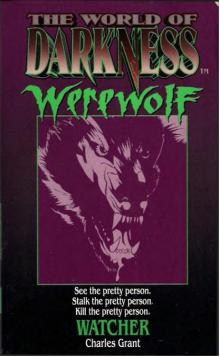 Watcher: Based on the Apocalypse (World of Darkness : Werewolf)
Watcher: Based on the Apocalypse (World of Darkness : Werewolf)![[Oxrun Station] The Bloodwind Read online](http://i1.bookreadfree.com/i/03/25/oxrun_station_the_bloodwind_preview.jpg) [Oxrun Station] The Bloodwind
[Oxrun Station] The Bloodwind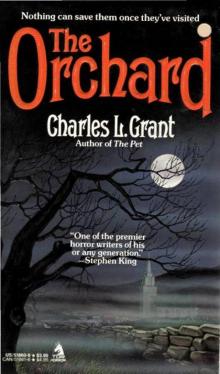 The Orchard
The Orchard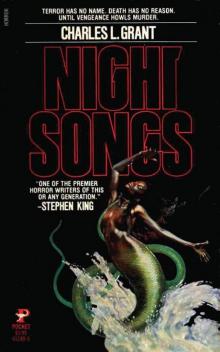 Night Songs
Night Songs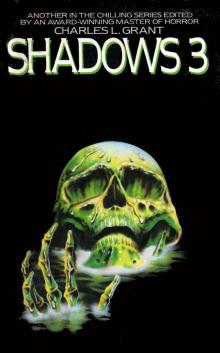 Shadows 3
Shadows 3![Symphony - [Millennium Quartet 01] Read online](http://i1.bookreadfree.com/i1/04/02/symphony_-_millennium_quartet_01_preview.jpg) Symphony - [Millennium Quartet 01]
Symphony - [Millennium Quartet 01] The Hour of the Oxrun Dead (Necon Classic Horror)
The Hour of the Oxrun Dead (Necon Classic Horror)![In the Mood - [Millennium Quartet 02] Read online](http://i1.bookreadfree.com/i1/03/31/in_the_mood_-_millennium_quartet_02_preview.jpg) In the Mood - [Millennium Quartet 02]
In the Mood - [Millennium Quartet 02]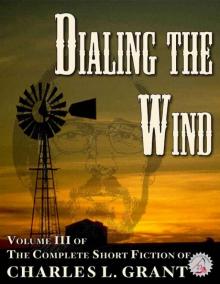 The Complete Short Fiction of Charles L. Grant Volume 3: Dialing the Wind (Neccon Classic Horror)
The Complete Short Fiction of Charles L. Grant Volume 3: Dialing the Wind (Neccon Classic Horror)![[Oxrun Station] The Last Call of Mourning Read online](http://i1.bookreadfree.com/i2/04/05/oxrun_station_the_last_call_of_mourning_preview.jpg) [Oxrun Station] The Last Call of Mourning
[Oxrun Station] The Last Call of Mourning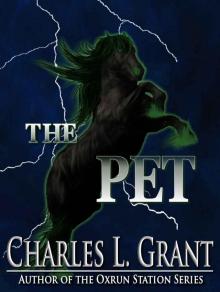 The Pet
The Pet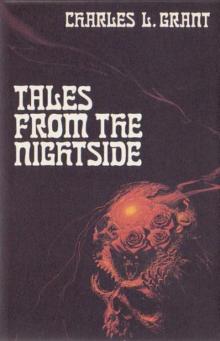 Tales from the Nightside
Tales from the Nightside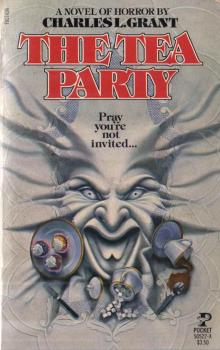 The Tea Party - A Novel of Horror
The Tea Party - A Novel of Horror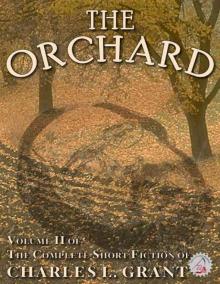 The Complete Short Fiction of Charles L. Grant Volume 2: The Orchard (Necon Classic Horror)
The Complete Short Fiction of Charles L. Grant Volume 2: The Orchard (Necon Classic Horror) Whirlwind
Whirlwind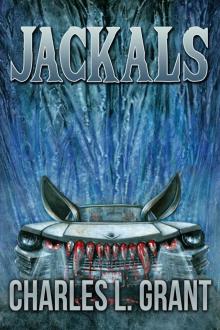 Jackals
Jackals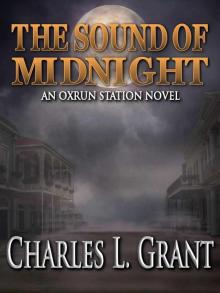 The Sound of Midnight - An Oxrun Station Novel
The Sound of Midnight - An Oxrun Station Novel